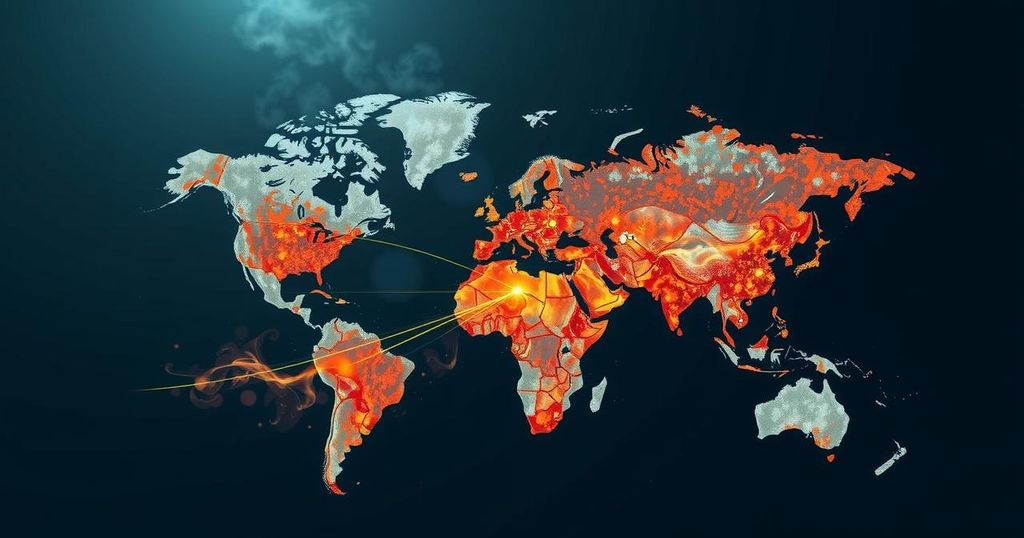A Lancet Countdown report reveals that climate change is leading to rising heat-related deaths and diseases, with the average person encountering an additional 50 dangerous temperature days in 2023, the hottest year recorded. Severe impacts include growing food insecurity and financial losses, prompting calls for urgent action at the upcoming COP29 climate conference.
A recent report from the Lancet Countdown highlights alarming trends in health outcomes linked to climate change. In 2023, deemed the hottest year on record, the average individual encountered an additional 50 days of dangerous temperatures attributable to the climate crisis. This annual report, compiled by 122 experts including members of the World Health Organization (WHO), underscores a dramatic rise in heat-related fatalities and the proliferation of infectious diseases, against a backdrop of drought and food insecurity. The report emphasizes that current policies, if maintained, place the world on a trajectory toward a temperature increase of 2.7 degrees Celsius by the year 2100. Among 15 indicators monitored over the past eight years, ten have reached alarming new highs, including spikes in extreme weather incidents, increased mortality among the elderly due to heat exposure, and significant food shortages due to the prevailing droughts and floods. Particularly vulnerable populations include the elderly, with heat-related deaths in individuals over 65 soaring to levels 167 percent greater than those observed in the 1990s. Marina Belen Romanello, the executive director of Lancet Countdown, noted, “Year on year, the deaths directly associated with climate change are increasing. But heat is also affecting not just the mortality and increasing deaths but also increasing the diseases and the pathologies associated with heat exposure.” Financial ramifications are also notable; last year’s extreme heat resulted in a staggering loss of 512 billion potential work hours, translating to substantial potential income losses globally. The report criticizes various entities, including major oil and gas corporations, for exacerbating climate change by increasing fossil fuel production and receiving government subsidies in response to global energy market fluctuations following geopolitical events. The increased reliability of food sources is increasingly jeopardized, with up to 48 percent of global land experiencing severe droughts last year, impacting approximately 151 million more individuals compared to the historical baseline of 1981-2010. Concurrently, extreme flooding, affecting 60 percent of land areas, heightened risks of water contamination and infectious diseases, notably mosquito-borne illnesses such as dengue fever. The authors of the report have called on participants of the upcoming United Nations climate conference, COP29, set to commence in Azerbaijan on November 11, to prioritize funding for public health initiatives addressing these challenges. Despite this grim landscape, some progress is noted; deaths from fossil fuel-related air pollution declined by nearly 7 percent from 2016 to 2021, attributed chiefly to reduced coal burning. Furthermore, the contribution of clean renewable energy sources to electricity generation has nearly doubled during the same period, now accounting for 10.5 percent. However, Romanello cautioned, “No individual or economy on the planet is immune from the health threats of climate change.”
The Lancet Countdown report serves as a critical annual assessment of the intersection between climate change and public health. Research indicates that rising global temperatures are linked to increased mortality rates and the spread of infectious diseases. Vulnerable populations, particularly the elderly, bear the brunt of these effects. The report examines trends related to extreme weather events, their health implications, and the socio-economic costs associated with climate-induced labor losses. The findings also highlight the role of fossil fuel production in exacerbating the climate crisis, while calling for urgent policy action at international forums.
The findings from the Lancet Countdown report paint a troubling picture of the escalating health threats imposed by climate change. With significant rises in heat-related mortality and diseases, particularly among the elderly, and substantial economic impacts from lost labor, there emerges an urgent need for transformative climate action. The call for prioritizing health in climate policy underscores the need for a comprehensive approach to address both health and environmental challenges.
Original Source: www.aljazeera.com






